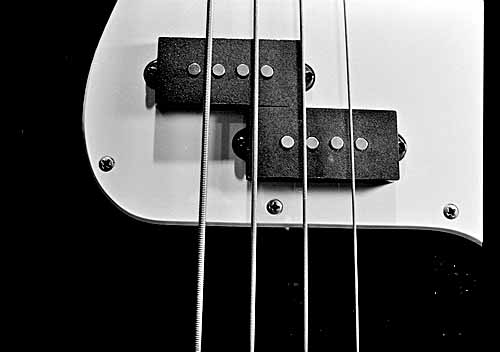The dual coil design of the split humbucker eliminates the 60-cycle hum that can create background noise on single coil pickups. Humbucker pickups have a fatter sound than single-coil models, as well, and are great for getting a vintage-styled tone. Within this broad tonal definition, though, individual pickups have their own sound profiles, determined largely by the materials used in the pickup construction.
What style you play in is going to determine which pickup is right for you. Whether you want a smooth tone or one with edge, a sound that’s heavy in the bass or one that brings out the higher tones, one of the pickups on this list is bound to give you what you’re looking for. There are, in our humble opinion, the best P Bass pickups on the market.
Seymour Duncan Quarter Pound P-Bass Pickup
This pickup uses large diameter Alnico 5 magnets to expand the magnetic field and extend the frequency range, which translates to a big mid-range presence and a powerful, punchy sound throughout. Played hot, the bass booms but doesn’t overwhelm the sound or get muddy, making it ideal for hard rock players; roll back the volume for an open, warm mid-range that’s perfectly suited to funk or jazz ensembles. The poles are vacuum wax potted to avoid feedback at all dynamic levels. Installing this pickup on your bass gives it an incredible new range of tonal possibilities, making these among the best Precision Bass pickups you can buy. Just check out the video below (first play of song is with stock pickups, the second with these Seymour Duncans):
Fender Custom ’62
The Fender Custom ’62 is an artful reproduction of the original 1962 precision bass pickups put out by the Fender shop. This pickup uses flush-mounted Alnico V magnets and enamel-coated magnet wire to deliver a balanced tone that’s tight in the bass and strong in the mid-range with nice snappy highs. The overall tone is brighter than most P bass pickups. If your playing style uses a lot of technique or if you’ve been feeling like your tone is too dark or muddled, these Custom ’62 pickups (see full specs) an clear up your sound and give your lines the precision and articulation they’ve been missing. Clearly, these could arguably be the best P Bass pickups on the market.
DiMarzio Model P DP122K
If you’re looking for more power, you should look no further than the DiMarzio DP122K. These are high gain pickups designed for those that favor an edge to their sound and like some mid-range growl. You can tame it down with EQ for more of a classic tone, but these are pickups that really shine when they’re hot. The overall sound is balanced toward the low end, with an emphasis on fat bass over the treble, but don’t take this to mean the sound is muddy; articulation is clear throughout the range. It uses a ceramic magnet to maximize the output and give you consistently accurate signal reproduction at any dynamic level.
Bartolini 8S
This 8S pickup from Bartolini delivers one of the smoothest tones of any p-bass pickup on the market. The ceramic magnet improves the output in the mid- and low-range frequencies, meaning you can give your tone an edge without it grating in the upper range. The poles are epoxy cast to eliminate unwanted microphonics. Because they naturally give you less response from the high end, you can push the treble more in your EQ mix, ultimately giving you a more balanced overall sound with a natural and accurate signal reproduction. These (see full specs) should be on anyone’s list of the best P Bass pickups.
Bass Pickup Materials
Bass pickups are set up a bit differently than those used on guitars. There are two magnet pole pieces per string typically in a bass pickup. In split humbuckers, like those used on P basses, these magnetic poles take the form of screws and rods. While conventional wisdom in the guitar pickup world prefers Alnico magnets over ceramic, the opinions on the ideal magnet material for a bass pickup is more mixed.
Bassists who play in heavier styles especially often prefer the powerful output and hotter tendencies of a ceramic magnet over the smoother tone of many Alnico magnets. P bass pickups that use Alnico magnets are likely to use an Alnico V, which is the magnet material used in the Fender ’62 pickups listed above. Since it’s the strongest Alnico magnet regularly used in guitar pickup construction, Alnico V magnets have a more aggressive tone than other classes. They tend to give the tone a bright edge with a punchy bass that can be especially appealing for players of blues and funk.
If you’re not sure what kind of pickup will work best with your bass, try unplugging it from your amplifier and listening to the sound coming from the unplugged strings. Consider what characteristics you like about the sound, and what you’d like to change, then choose a pickup that brings out or obscures those characteristics respectively. If the unplugged sound feels muddled or muddy, a pickup that brightens the sound and gives your notes a crisper attack will fix those issues. If the upper tones are too strident or bright, choose a pickup that emphasizes more of the mid- and low-tones to keep your treble from going grating when you crank the gain.
P/J Bass
Straight precision basses aren’t the only ones that will use P bass pickups. For some people who want to strike a balance between a precision bass and a jazz bass, a P/J pickup set up on their guitars can give you the best of both sounds. The “j” in P/J stands for jazz bass, which typically uses two single coil pickups instead of the precision bass’ single split humbucker. A P/J bass uses a precision bass pickup in the neck and a jazz bass pickup in the bridge position, to give you both the low power of a p bass and the barking edge of the jazz bass.
If you’re buying a new pup for this kind of setup, the power and depth of the low end is going to be more important than the edge and articulation, which you’ll get from the jazz pickup. The Seymour Duncan Quarter Pound and the Fender Custom ’62 on the list above are both tried and true options in a P/J set up and would likely be the best P Bass pickups for this use.








